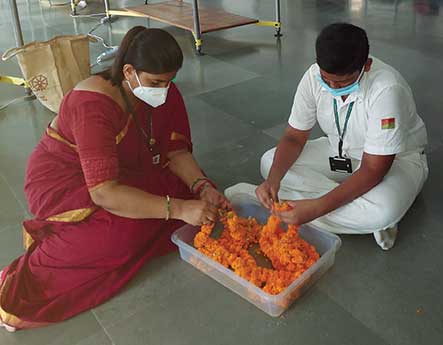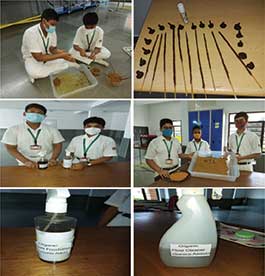Sandhya Singh
What is the first thing that comes to mind when we are making offerings to the almighty, or when festive and wedding seasons are around? Flowers surely will be one among several things you can think of. Any kind of celebration feels incomplete without floral decorations.

While it is true that flowers are at the heart of all kinds of celebrations, are we putting any thought to the waste (floral waste) we are producing after the festivities are over? No, we think that is not our job. What is the solution to this problem? What is the impact of floral waste on the environment? Are there ways to manage this waste? As teachers who inspire the next generation, how do we sensitize students towards such environmental concerns?
My students and I used the Atal Tinkering Lab in our school to brainstorm and decided to follow these steps to find some answers.

Empathize: Every morning, as I wait for my bus, I see that flowers used in the nearby temple the previous day are thrown out as garbage the next day. People offer these flowers with great piety but they end up as waste in the dumping ground or in rivers. This motivated us (my students and me) to find ways to utilize floral waste.

Define: The management of organic waste is a real concern. Floral waste coming out of temples, marriages, festivals, or those shed by trees became our raw material. It is estimated that around 800 million tonnes of flowers are offered in temples, gurudwaras and mosques across the country every year* and that 16 per cent of the river water pollutants is flower waste**. The pesticides used to grow these flowers – arsenic, lead and cadmium – mix with water and result in algal bloom, which makes the water highly toxic and oxygen deficient for marine life.
Ideate: “Think out of the Box”. This is the sole mantra of the ideation phase. We started by listing out the products that can be made from floral and other organic waste. These are what we came up with.
1) Incense stick, cone
2) Organic floor cleaner
3) Organic room freshener
4) Herbal floor disinfectant
5) Organic paper
Prototype: Using the equipment available at the lab we produced the products that we had listed down.

Artificial Intelligence interface: To spread awareness about floral waste and its management, we developed an app using “MIT App Inventor”. The idea is to reach a large number of people in a short span of time.

*In these temples, offerings do not go waste (downtoearth.org.in)
**Flower Pollution: Reviving the Ganges and Providing Livelihoods – Impakter
The author is the ATL in-charge and library educator in Delhi Public School, Patna. Her association with ATL has made her think of organic waste produced by humans and its impact on the environment. She can be reached at sandhya.dpspatna@gmail.com.
